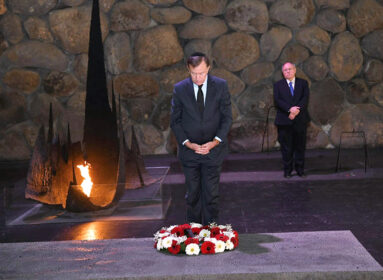In her new book, a Connecticut poet sings the music of our lives – births and deaths, friends and family, sickness and health
By Avigayil Halpern
STORRS – Joan Seliger Sidney is writer-in-residence at the University of Connecticut’s Center for Judaic Studies and Contemporary Jewish Life. A later-in-life poet and the daughter of Holocaust survivors, her work focuses on themes of memory, history, and bearing witness. Her writing also explores how one lives well with multiple sclerosis, with which she has suffered since her mid-twenties.
A resident of Storrs, Sidney is the recipient of poetry fellowships from the Connecticut Commission on the Arts, the Craig H. Neilsen Foundation, the Christopher Reeve Paralysis Foundation, and Vermont Studies Center. She has lived and taught in France, and has also taught at the University of Connecticut and Eastern Connecticut State University. Currently, she also teaches a “Writing for Life” adult workshop.
The author of four books of poetry, her poems have also appeared in several anthologies, such as the anthologies and periodicals, including The Massachusetts Review, Jewish Currents, Michigan Quarterly Review and the Anthology of Magazine Verse & Yearbook of American Poetry.
Recently, the Ledger spoke with Sidney about her newly released book of collected poems, Bereft and Blessed.
Q: Tell us about how you became a poet?
A: That’s interesting, because I was an English major in college; I always liked writing, you know, term papers and papers about literature. Really, when I was in college I never took a poetry course and never wrote a poem. Many years later, I was unemployed – I had been an educational administrator, I have a PhD in education. And I think the disappointment that my job was cut off made me react all of a sudden by writing poetry and sitting in on some UConn poetry courses, which really got me started. After the first course, I invited some adults who also had been auditing a writing course to join me; and so I taught a little writing group. We would meet once every two weeks. Then I started getting feedback on my poems, and that’s always very, very useful.
Q: And now you’ve completed your third collection of poetry.
A: Well, actually, it’s my fourth. I have two full-length collections, Body of Diminishing Motion and this last one, Bereft and Blessed. A ‘chat book’ is a soft-cover collection of poems or stories; a small collection. I have two chatbooks: the first one is called Deep Between the Rocks, those are really very early poems of mine; and, The Way the Past Comes Back, which was a letterpress chatbook [illustrated by Evelyn Askey], meaning it was printed on special paper. A letterpress chatbook is a work of art. The poems in the second chatbook are much more advanced, so that’s why it seems like I only have the three collections, but in reality Bereft and Blessed is the fourth. I sort of don’t count the first for publicity purposes because it is so rudimentary.
Q: Talk about the themes you explore in Bereft and Blessed.
A: They seem to be my usual obsessions; that is, as a second-generation Holocaust survivor it’s very important to bear witness and I do this by transforming my parents’ stories, and stories of relatives, and also of people whom I might come across in Holocaust books. I’ll transform as much as I can into poetry.
The other theme centers around my Multiple Sclerosis. I’ve had Multiple Sclerosis (MS) for so many years and first I thought that there was some connection – I wondered if second-generation Holocaust survivors wound up with MS. I explored that a lot in my first book, Body in Diminishing Motion, but I think it was a dead-end, that it’s just coincidence.
The [academic] year 1984-85 was the year that I had a visiting faculty fellowship at Yale. Once a week I went down to New Haven from Storrs and I would watch Holocaust testimonies — survivor testimonies. That year my MS progressed; it became much harder for me to walk. That was why I wondered whether my dealing with such a difficult, difficult subject was causing more stress. Then it ceased to progress. But I don’t think that there’s any real relationship with the two.
Many years ago, it was really hard for me to tell my parents that I had MS. I have a poem, Regrets, in the newer book that was also online in a national MS society publication. It expressed how difficult it was to talk to my parents about this; that I tried to protect my parents, as Holocaust survivors, from the bad news that their daughter, who had always been so perfect, was human and had a progressive disease. So, my father never even knew; he died before I came out. It’s summed up in the poem.
Q: What does being the writer-in-residence at the Uconn Center for Judaic Studies entail?
A: Sometimes I’ll give lectures, readings; part of the time I invite speakers. I help with programming, especially for the Holocaust convocation every year, and there are lots of ongoing lectures for which I like to bring in guest lecturers. I’m hoping Baron Wurtzer will come this fall. Wurtzer was poet-in-residence in Maine; he now lives in Vermont. He grew up in Baltimore in a very big Jewish and black neighborhood. It’s interesting, because at UConn there’s a Jewish-Afro-American Institute, and if he comes in April he’d be cosponsored by the Judaic Studies department as well as this institute. I’m a good networker – if I meet people whom I think would be especially interesting to the Jewish community, I try to get them to give a lecture at UConn.
Q: What exactly do you teach on in your adult “Writing for Life” workshop?
A: More than teaching, I facilitate. I have a group of people who range in age from early 30s to mid-80s, and they come to my house and I give them writing prompts and they’ll write for about an hour. We meet around my dining room table and then they all read what it is that they wrote, and people will give positive criticism to see what stands out in their mind. It’s just amazing; my belief is that everybody has a story to tell. And there are just so many people who say, “I always wanted to write but I’ve never had the chance.” Now they come and they write, nobody’s grading them or criticizing them or embarrassing them, or any of that. I always feel that we should be putting together a book of their stories. I always tell them, ‘Put together your own book and give it to your family,’ which some of them have done. Maybe they’ve not done a book, but they’ve done a little chatbook. It’s exciting to have the opportunity to work with such a diverse group.
Q: What tip or advice would you have for an adult who wanted to start writing?
A: Write every day, even if it’s only for fifteen minutes. Your writing should come before your email and all other things; so many of us put writing last. I had one student who was a weaver, and she wrote a beautiful piece one night in which she said that she makes sure she weaves every day, even if it’s just five minutes a day, and she’s just setting up her loom for the next project. If you do it every day, in the end you’ll wind up with something – whether it’s a wall hanging or a lampshade or whatever; that five minutes a day adds up to something. We talk a lot in writing about the product not being as important as the process. Just do it every day. For me, I write to discover what it is I need to know; and I find the same thing with my students – that they’ll write something and be very surprised at the end.
An excerpt from Bereft and Blessed
EDWARD FINDS A PHOTOGRAPH FROM ZURAWNO, 1942
Who snapped this black and white
of Frederik, my older brother
and his friends? Except
for Igor, who’s Gentile, everyone’s
wearing armbands. Look at Henya,
my dreamsecret. Like Hedy Lamarr,
black hair tucked back. Mama used to say,
“After we’re saved, she’ll marry
an American officer.” For a few months
before the Aktion, all of us
squeezed together in one room, a world
away from the house we used to rent
from Henya’s parents in the building
they owned before. Behind her, Ezio,
Papa’s partner’s son. Eyes like coal,
body thin as a fox. Nights
we raided neighbor’s fields
for potatoes to take home. Never,
never enough. Papa lay in bed,
heels swollen from starvation.
copyright © 2014 by Joan Seliger Sidney








 Southern New England Jewish Ledger
Southern New England Jewish Ledger











